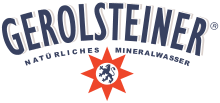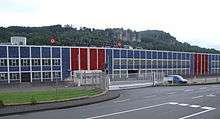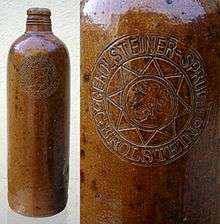Gerolsteiner Brunnen
 | |
| Country | Germany |
|---|---|
| Source | Gerolstein |
| Type | sparkling |
| pH | 5.9 to 6.0 |
| Bromine (Br2) | 0.12 |
| Calcium (Ca) | 348 |
| Chloride (Cl−) | 39.7 |
| Bicarbonate (HCO3) | 1816 |
| Fluoride (Fl) | 0.21 |
| Lithium (Li) | 0.13 |
| Manganese (Mn) | 0.39 |
| Magnesium (Mg) | 108 |
| Nitrate (NO3) | 5.1 |
| Potassium (K) | 10.8 |
| Silica (SiO2) | 40.2 |
| Sodium (Na) | 118 |
| Strontium (Sr2) | 2.9 |
| Sulfates (SO4) | 38.3 |
| TDS | 2488 |
| Website | gerolsteiner.de |
| All values in milligrams per liter (mg/l) | |
Gerolsteiner Brunnen GmbH & Co. KG (Gerolsteiner) is a leading German mineral water firm with its seat in Gerolstein in the Eifel mountains. It is well known for its Gerolsteiner Sprudel brand, a bottled, naturally carbonated mineral water. This water, in addition to hydrogen and oxygen (H2O) and carbon (in the carbon dioxide (CO2) carbonation), contains at least the following chemical elements in amounts of 100 or more micrograms per liter: bromine, calcium, chlorine, fluorine, lithium, magnesium, manganese, nitrogen, potassium, silicon, sodium, strontium, and sulfur. The strontium is naturally occurring, not the radioactive strontium-90. Gerolsteiner was also the chief sponsor of a cycling team, Team Gerolsteiner.
History


On January 1, 1888, the mine manager Wilhelm Castendyck founded the firm Gerolsteiner Sprudel as a GmbH in Gerolstein. In the same year, the first well was drilled. In November 1888, the water became a sort of official water of the city and became popular because of its high amount of natural carbonic acid. In 1889 its star and lion symbol was trademarked. Already in 1895, the water had been exported to Australia.
Brunnen table water used to supply water to Buckingham Palace during the reign of Queen Victoria.[1]
The first exports of Gerolsteiner to the United States started in 1890, primarily to Chicago, known for its high concentration of German emigrants. Having been interrupted by World War I, U.S. shipments resumed in 1928.[2]
The Gerolsteiner factory was completely destroyed in a bombing raid over Christmas 1944. In 1946 the filling machines were repaired and the full building and installation were rebuilt by 1948.
In 1986, it introduced a brand with a lower amount of carbonic acid to meet changing tastes.
In 1998 the company introduced Germany's first PET reusable deposit carrying mineral water bottle to a chorus of criticism from environmental groups.[3] (The use of returnable deposit bearing glass bottles for water, beer and other mainstream drinks has long been normal in Germany and other European countries.)
See also
- Mineral water
- Apollinaris (water)
- Badoit
- Evian
- Farris
- Perrier
- Panna
- Rosbacher
- San Pellegrino
- Ramlösa
- Spa
References
- 111 Jahre Gerolsteiner Brunnen, HG: Gerolsteiner Brunnen GmbH & CO